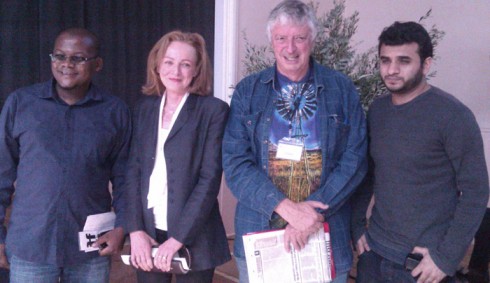The in-between 80s, 11 May 2012, Franschhoek Literary Festival, Franschhoek
WAMUWI MBAO

Ndumiso Ngcobo, Elaine Proctor, Denis Beckett, Azzad Essa
There’s a lot of wordshedding going on in Franschoek right now, so you’ll have grasped from the other reports in the Slipnet’s FLF Reporting Attack that it’s a picturesque place with school halls, church halls, and other kinds of halls. One of the more interesting events (in a hall) is the Friday discussion on “The in-between 80s” – what it means to have been born and come to fruition in the last fitful gasps of the dying old order.
Ndumiso Ngcobo, satirical Sunday Times columnist and author, begins the session by introducing himself and his literary accomplices. Perhaps the most familiar face is that of Denis Beckett, an author and journalist-type whose relation to Samuel-of-the-same-surname no article can go without mentioning. Then there’s Azzad Essa, the only person on the panel who looks to have been born in the eighties, and an author, journalist and blogger. Finally, amidst this masculine chorus there sits Elaine Proctor, who has written a book recently. They are arranged before us to discuss what it means to belong to the “lost generation” who were caught up in that transitional moment when the long-running Apartheid show closed shop and the credits began to roll.
Beckett goes first, and he fires out a bellicose salvo in which he dismisses the idea of the past as something special and distinct. “For the people living in shacks now,” Beckett declares stirringly, “the difference between what was Apartheid then and what is freedom now is a bit of a notional difference.” With this, the crowd is warmed up and the freeze-dried topic becomes alive and inviting. Ndumiso takes back the reigns and agrees with Denis that the notion of a “magical cut-off date”, a day “where we slept with the sky orange and we woke up and the sky was blue”, is misleading. He throws the point to Elaine and Azzad, who are somewhat more subdued, though no less forthright in their responses.
Elaine tells us that she was 16 in 1976, and she marks the point of uprising as her political awakening: “the decade of 1976 to 1986 was full of small, hysterical shifts and changes that meant that I and my contemporaries moved from childhood to adulthood at a time of intense political and social upheaval.” She talks about witnessing her brothers weep as they spoke of their experiences, and her attempts to record, “in the most fantastically inept way”, the political situation as it was happening around her. From this, she says, evolved her desire to write fiction about her country.
Ndumiso brings it to our attention that it is Assad’s 30th birthday, and asks him how he would answer the question. “How do we write about that generation?” Assad asks by way of reply: “How do we write about a place that is changing?” He tells us how he felt, as a ten-year old, that something was changing, without quite knowing what that was. Describing “the fever of change”, he relates it to the Arab Spring, pointing out that it is difficult, nigh-on-impossible to write about what is happening while it is happening – “Malema is part of that fever...Zuma is part of that fever...where does it end?” He subtly echoes Denis’ opening gambit.
Ndumiso suggests that Jacob Dlamini’s Native Nostalgia might provide a way forward, with its emphasis on the normal ways in which people ate, lived and went about their daily lives. “Is there a danger”, he asks the group, “if we do not go back now in 2012 and start to interrogate what was happening in the 1980s, that we might lose certain aspects of the ways in which people lived and went about their lives?” Ndumiso cites the aphoristic truth that writers are always expected to write about the brutality of Apartheid. Denis responds that perhaps the most overwhelming of all realities, is that people get on with their lives and live as normally as they can.
And so it goes on. The questions from the audience are by and large unexceptional, but the crowd certainly feels a synthesis with the panellists, who are ably shepherded by Ndumiso. It is a conversation with no realisable conclusions, and so it ends on an inconclusive, if optimistic note. Except that it doesn’t quite end, as the reaching of the time limit is simply a cue for the conversation to spill out of the scholastic venue and down onto the autumnal streets of the French Corner.
 SLiPStellenbosch Literary Project
SLiPStellenbosch Literary Project